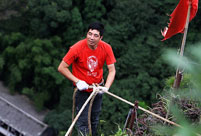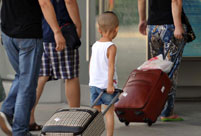And the distressing fact is that numerous parents and their schoolchildren are trying to follow suit by treading this "success path" glamorized by a media limelight which claims a magic route to success if their children simply follow a certain "formula" of education.
Empirical cases of success do not indicate what amount of formal education is necessary for a person to be an effective social climber or, better yet, an accomplished scholar, entrepreneur, or statesman.
Then there comes the measure for successful education. If we commit ourselves to the belief that a rose-like student is to be tended differently from a lily-like student, we would not have vehemently adhered to inflexible "standards" in education that "trim" each student into identical "models".
Indeed, setting exemplary "models" for educators or students is another problem. We always wonder and marvel at the astonishing fact that so many unique and creative children become so many identical and boring adults. Such a phenomenon can be partially ascribed to the "model teachers" and "model students" who serve as exemplars for all others to emulate.
While such policies and practice is well-intended, they run contrary to the sound logic of education, which should aim at letting each student become the best of him/herself, different from, but equal, to others.
The problems in "standards" and "models" lead us to the next question about education, and that is how knowledge should be acquired so that it can be applied and advanced.
All the way up to college entrance exams, students are required to sit for exams that trick them into figuring out the "right answer" to every question, even in subjects such as literature and history. Even my college students often panic when they feel that they failed to "guess" what might be the "right answer" in the teacher's mind.
In such cases, what the students badly need is the assurance that they should personalize the knowledge they have learned and turn it from mere "head knowledge" into a kind of "heart knowledge", which incorporates their personal life experience in the emotional, physical and intellectual realms.
Too often I have to give a gentle reminder to my poor students who have been used to being spoon fed all the way through their education, "Stop trying to guess right. Don't even worry too much about how to do right. Just be right with yourself, with a sincere attitude in seeking the truth on your own, and then share your findings with others in your own words".
It is high time that educators re-examined themselves as "gardeners" rather than "engineers" of the human soul.
The best advice we can give to overly eager parents and students craving for worldly success is to "do the best, and leave the rest, and do not worry".
The author is a professor with the School of Journalism & Communication at Xiamen University.

 2013 Colour Me Rad 5K run held in Canada
2013 Colour Me Rad 5K run held in Canada China's destroyer Qingdao sails out of Sydney Harbor
China's destroyer Qingdao sails out of Sydney Harbor Chinese tycoon aims to restore London's Crystal Palace
Chinese tycoon aims to restore London's Crystal Palace Typhoon Fitow affects 4.56 million people in east China
Typhoon Fitow affects 4.56 million people in east China Game for the brave: 'Spiders' in Yandang Mountains
Game for the brave: 'Spiders' in Yandang Mountains Travel peak witnessed on last day of National Day holiday
Travel peak witnessed on last day of National Day holiday  New couples take wedding photos during holiday
New couples take wedding photos during holiday Serena Williams stumbles through to quarterfinals
Serena Williams stumbles through to quarterfinals Thailand Mobile Expo 2013 kicks off
Thailand Mobile Expo 2013 kicks off Photo collection of Chinese Navy
Photo collection of Chinese Navy Dense haze envelops N China
Dense haze envelops N China Twins Culture Festival kicks off in Beijing
Twins Culture Festival kicks off in Beijing UNESCO world heritage site: Montale Tower
UNESCO world heritage site: Montale Tower Israeli drone crashes into Mediterranean, fragments recovered
Israeli drone crashes into Mediterranean, fragments recovered Serena Williams wins second China Open title
Serena Williams wins second China Open titleDay|Week|Month